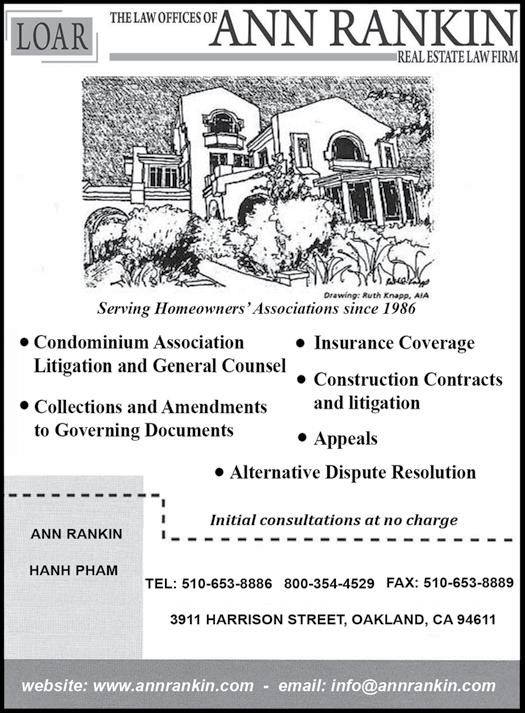
6 minute read
Southern California Calendar
upcoming courses & events
LEGEND Events Online Courses Classroom Courses
DATE
JUNE
4 4-5 11-12 13-14 18 19 20 25-26 26-28 26-27
JULY
2 11 11 18 25
COURSE/EVENT
Regional Forum Luncheon California Law Series: Modules 1-4 Age-Restricted Active Adult Module 1 California Law Series: Modules 1-4 Advanced Insurance Principles Executive Connection Webinar Human Resource Management Conflict Resolution for Community Managers Module 1-2 Large Scale Community Management The Basics of Community Association Management - BAM 1-2
Reserves: What, Why, How? FIN200 California Law Online Module 1 Foundational Ethics for Community Managers California Law Online Module 2 California Law Online Module 3
AUGUST
1 6 8 13 15 20 22 27 28-29 California Law Online Module 4 Attorney Connection Webinar 1 California Law Online Module 5 Attorney Connection Webinar 2 California Law Online Module 6 Attorney Connection Webinar 3 California Law Online Module 7 Attorney Connection Webinar 4 California Law Series: Modules 1-4
SEPTEMBER
4 Insurance Principles 6 Advanced Ethics: Leadership & Decision Making 6 Foundational Ethics for Community Managers 10 Explaining Financial Statements 12-13 Effective Meetings & Election Tools Modules 1-2 16-17 Strategic Financial Planning Modules 1-2 18-20 Portfolio Management 23-24 Fundamentals of Effective Governance Modules 1-2
OCTOBER
1-2 2 2 3-4 7-8 10-11 15 15-16 22 23 28-29 30 31 Assessment Collections Modules 1-2 Foundational Ethics for Community Managers Advanced Ethics: Leadership & Decision Making High Rise/Large Scale Summit Conflict Resolution for Community Managers Modules 1-2 California Law Series: Module 1 Human Resource Management The Basics of Association Management - BAM 1-2 Regional Forum Luncheon Regional Forum Luncheon Budgeting Modules 1-2 Regional Forum Luncheon Regional Forum Luncheon
NOVEMBER
5 The Basics of Association Management Online: Module 1 6 Risk Management in Community Associations 7-8 Enhance Your Professional Presence Modules 1-2 12 The Basics of Association Management Online: Module 2 13 Regional Forum Breakfast 13-15 High Rise Community Management 19 Ethics Mastery 19 The Basics of Association Management Online: Module 3 21 Reserves: What, Why, How? 26 The Basics of Association Management Online: Module 4
DECEMBER
3 The Basics of Association Management Online: Module 5 4-5 California Law Series: Modules 1-4 10 The Basics of Association Management Online: Module 6 12 Holiday Party 17 The Basics of Association Management Online: Module 7 18-19 The Basics of Association Management - BAM 1-2
COURSE/EVENT CODE
FRMSD CMM121-124 SPC420 CMM121-124 INS300
LDR400 CMM230 SPC410 CMM101-102
CMM130
CMM121
INS200 LDR500 CMM130 FIN220 BDA220 FIN320 SPC430 BDA300
FIN210 CMM130 LDR500 HRLSS CMM230 CMM121-124 LDR400 CMM101-102 FRMLA FRMPO FIN300 FRMOC FRMSD
INS400 CMM200
FRMCV SPC400 LDR550
FIN200
CMM121-124
CMM101-102
LOCATION
San Diego Orange County Online Coachella Valley Online Online San Diego Online Orange County Bakersfield
Online Online Los Angeles Online Online
Online Online Online Online Online Online Online Online San Diego
Online San Diego San Diego Orange County Online Online San Diego Online
Online Orange County Newport Beach Newport Beach Online Orange County Los Angeles San Diego Los Angeles Pomona Online San Diego Orange County
Online San Diego Online Online Coachella Valley San Diego Orange County Online Online Online
Online San Diego Online SoCal Online Orange County
Q&A with Phyllis Harkins, CAMEx, CCAM-LS and CACM Board Chair On What It Means to Be a Servant Leader

By Emily Yost, CACM Director of Marketing & Communications
Servant leadership is a concept coined by Robert K. Greenleaf in 1970. A servant-leader focuses primarily on the growth and well-being of people and the communities to which they belong. While traditional leadership generally involves the accumulation and exercise of power by one at the “top of the pyramid,” servant leadership is different. The servant-leader shares power, puts the needs of others first and helps people develop and perform as highly as possible.
Some of the most well-known advocates of servant leadership include Ken Blanchard (The One Minute Manager), Stephen Covey (The 7 Habits of Highly Effective People), Peter Senge (The Fifth Discipline), M. Scott Peck (The Road Less Traveled), Margaret Wheatley (Leadership and the New Science) , and Ann McGee-Cooper & Duane Trammell (The Art of Coaching for Servant Leadership).
CACM’s Emily Leader Yost recently sat down Management with CACM Board Chair Phyllis Harkins, Employees CAMEx, CCAM-LS, general manager of the Customers Portola Country Club Homeowners’ Association, to talk about servant Traditional Leadership leadership. Harkins has been volunteering all of her life. She grew up in an atmosphere of serving people and has served the HOA industry for over 16 years.
What is servant leadership to you, Phyllis?
HARKINS: I consider that I serve the companies and organizations I work with and volunteer my time in. Servant leadership means that I am there to serve for the greater good of that entity with my personal needs set aside.
What sparked your curiosity to learn more about this philosophy?
HARKINS: A number of years ago, CACM had a seminar (breakout on servant leadership) and it piqued my curiosity. The irony is that I believed in the “greater good” but I didn’t really know it was “servant leadership.”
Why is it important to our industry? Customers
HARKINS: It matters Employees because we are in the “people business.” We build Management and manage communities and our focus should
Leader always be on serving and building “community.” Sure, we are in the business
Servant Leadership to be profitable if possible, but servant leadership is essential to our success. Our interactions as a society have become more and more disconnected. Today, even when people carpool, they are on their phones the whole time. We live in a
disconnected world. In HOAs, this new disconnect impacts and often times impedes our interactions with boards, as well as homeowners. Finding ways to connect and serve others brings back a more ‘human’ interaction. I want managers and board members to think about why they are where they are. It is to serve the community. What a wonderful opportunity! That’s why I talked about this philosophy at the Law Seminars. If we don’t recognize the value of servant leadership and change how we view our positions and those of our board members, we are going to go further down a disconnected road.
Community managers are the professionals who are accountable to the volunteer board of directors and can speak to them about civil code and policy governance. We, as managers, should also be helping them be servant leaders and recognize the enormous opportunity they have. When boards embrace this, they are no longer agenda driven, but rather driven to serve others. It’s shifting a mindset.
What value does it bring to the individual work lives of our membership?
HARKINS: Servant leadership involves being a visionary. Oftentimes managers are forced to focus on the operational side of the business, which causes them to lose sight of the fact that there is no one who understands the community objectively better than the community manager. We can be objective unlike those who live in that community. This objectivity focuses a manager on the vision of the community’s future.
I’m committed to sharing the vision and value of servant leadership with all managers in our industry. My dream is that five years from now, all managers will catch the vision of servant leadership and incorporate it into their work lives.
Emily Yost is the Director of Marketing and Communications at CACM. She can be reached at eyost@cacm.org.
BEHAVIORS OF A SERVANT LEADER
Knowledgeable about the industry and wanting to know more.
Involved in the world of this business.
Excellent listeners. Harkins shares, “We have “two ears and one mouth” for a reason!”
Live their passion, but stay objective.
Trust builders with those around them Harkins shares, “They have to know that you believe in them as a team member.”
Have a passion for service.
They do and live their best.










